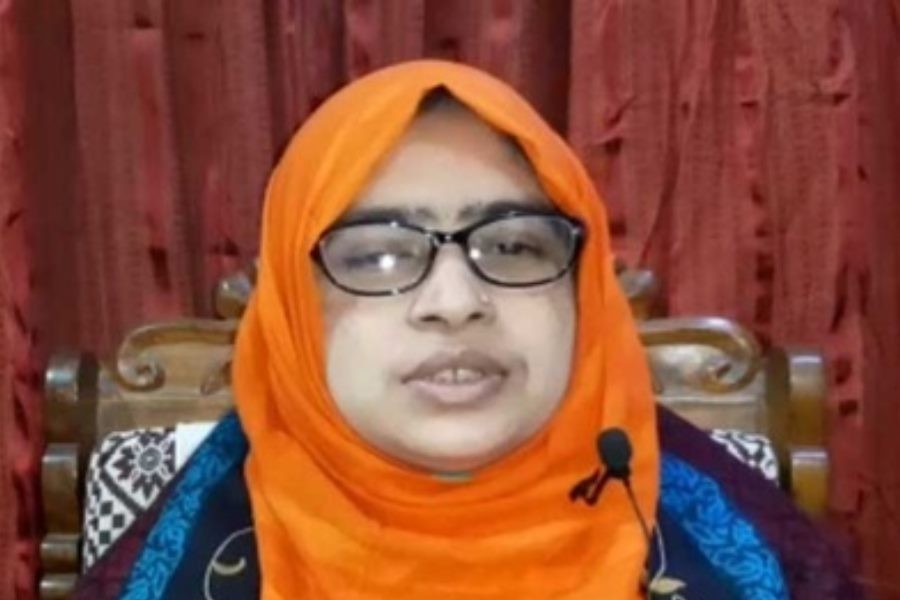Ayesha dreams of becoming a kazi, but her gender stands in the way

Published :
Updated :

Since her childhood days, Ayesha Siddiqua has watched absolute male dominance in solemnising Muslim marriages. She always nurtured the dream of breaking into the men’s domain by becoming a female kazi in Bangladesh, bdnews24.com reports.
A native of Dinajpur’s Fulbari, she took a leap of faith and applied for the position of Nikah or marriage registrar. But she was turned down for being a woman. Undeterred, she mounted a legal challenge against religious gender discrimination to earn her right to become a kazi in 2014.
A High Court ruling now stands between Ayesha and her dream but she is determined to continue her uphill battle for women's empowerment.
“I will continue the legal fight at the highest level of Bangladesh in my attempt to guarantee women’s rights,” she told bdnews24.com, referring to her efforts to challenge the High Court verdict.
“I think the court will reconsider the ruling,” Ayesha said as she was not convinced by the court’s arguments.
Ayesha feels the verdict, which upheld the law ministry’s decision, has the undercurrents of gender discrimination.
“I'm respectful to the law. But I think a woman is being deprived of her rights after being given a wrong explanation of the matter,” said the 39-year-old, who like her husband, works as a homoeopath after passing Fazil exams from Darul Sunnah Senior Siddiqia Madrasa.
Ayesha began waging her legal battle six years ago.
Registering marriages is not a government job and a kazi or marriage registrar can do so with a licence from the government for a fixed fee.
The requirements to become a marriage registrar are laid out in the guidelines issued by the Ministry of Law in 2009.
The rules stipulate that a candidate must at least have completed the Alim exams from a recognised university or madrasa registered with the Madrasa Board. Candidates must also be between 21 and 40 years of age while being a resident of the area in which they want to be the kazi or marriage registrar.
Ayesha ticked all the necessary boxes to be appointed as the kazi for Fulbari’s wards No. 7, 8 and 9, but still her application was turned down.
The law ministry in 2014 said it struck down Ayesha's licence application in view of the "ground reality in Bangladesh", where it is "not possible for women to act as marriage registrars”.
The same year, an individual named Sikandar Ali was appointed as the kazi of the area.
Ayesha subsequently moved the High Court against the decision not to employ her based on her gender.
The court then issued a rule asking why the law ministry’s decision to reject the proposal would not be deemed illegal and why the appointment of Sikandar Ali should not be declared out of legal authority in the light of a supplementary petition filed later.
But in February 2020, the High Court ruled against her and upheld the decision of the law ministry. The High Court recently released the full text of the verdict, triggering a debate about gender equality.
The bench of Justice Zubayer Rahman Chowdhury and Justice Kazi Zinat Hoque observed in the verdict that the primary job of a Nikah registrar is to administer the marriage between Muslim couples, which is essentially a religious event.
Some Muslim families are conducting the marriage formalities in mosques in urban areas now due to a lack of space, the verdict said.
But it should be kept in mind that certain physical conditions of women prevent them from entering the mosques and saying their daily prayers at a certain period every month, it said.
The 'physical disqualification' (menstruation) does not allow them to perform many religious activities and all must remember that marriage is a religious programme of the Muslims; hence it should be held in line with the rules of Islam, the ruling added.
Contesting the High Court’s reasoning about a woman’s physical unfitness, Ayesha argues, “Periods are not a disqualification. It has been given by the Creator.”
She thinks there are no religious bars to a woman becoming a marriage registrar as the job mainly entails registering a marriage and not conducting the process of marriage.
“The marriage certificate contains separate signatures of a groom, a bride, groom’s representative, bride’s representative, an imam and the registrar. Then how does a woman not qualify to be a marriage registrar?” she asked.
Mahmudul Hasan, Nikah registrar of Gazipur City Corporation’s ward No. 35, said Nikah registrar and kazi are indeed the same thing - the first one is a legal term while the second one is religious.
“A Nikah registrar mainly registers the marriage. And any Alem can administer the marriage while it is not mandatory to do the job at mosques.”
Ayesha is now gearing up to take the matter up with the highest court in the land. Lawyer Fawzia Karim, the chairman of Foundation for Law and Development, who is helping Ayesha with the appeal, said she has received the full text of the High Court verdict. She is preparing a plea seeking court's leave to file the appeal.
Ayesha contends the law ministry guidelines issued in 2009 on the appointment of Nikah registrar, do not mention that only men can do the job. Bangladesh’s Constitution also guarantees equal rights for men and women.
When women are making strides in politics, judiciary, law enforcement and many other professions, why then, should the job of a registrar be exclusive to men, she asks.


 For all latest news, follow The Financial Express Google News channel.
For all latest news, follow The Financial Express Google News channel.